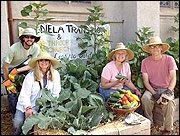'Learning Garden' sows connections between church and community
Pasadena congregation transforms barren corner into fertile partnership.
Kelley, who joined the congregation three years ago, had an interest in gardening, and he became interested in seeing what might be done to improve the church grounds, maybe replacing the grass with something more environmentally friendly.
He and several others did some tentative digging last fall. “We thought it couldn’t do any harm to dig up an exploratory patch,” he said.
As weeks went by, a couple of others joined in. It was slow going. Kelley could tell that the fledgling landscaping project was going to turn into a huge job if the whole lawn was dug up. And that was a daunting job for a congregation that had fewer than 40 members and a Sunday attendance of about 20.
About that time the church was approached by Northeast Los Angeles Transition, a community action group focused on environmental and sustainability issues as a way of preparing for the end of oil. A member of Throop, Eric Einem, who had been working with Kelley, and who was involved with NELA Transition, told the organization about Throop.
Said Kelley, “Transition is interested in transforming small landscapes and helping people get going on sustainability and food gardening. A lot of their participants like gardening, but don’t have land. So they partnered with us. They supplied volunteers, some tools, and helped us create a design.
“The first day—we broke ground in October 2011—we had 30 people, mostly from the community. Every weekend I met people I’d never seen before. Sometimes I’d only see them in the garden. And sometimes they’d come to services.”
The grass was removed, a new irrigation system laid, and a variety of plantings installed on the south and west sides of the church, a handsome Gothic-style building built in 1922-23 with an 80-foot bell tower, stained glass windows, and a sanctuary that seats 300.
And now, not quite a year later, the project is nearly complete. The lawn is mostly gone. In its place is a growing tapestry of fruit trees, vegetable gardens, and a patio. There are tomato plants, peppers, eggplants, beans, and collard greens in four raised planters. There is the promise of apples, plums, persimmons, and olives. There are robust pumpkin and squash vines, gifts from the compost pile. In short, the grass has been replaced by a gardener’s delight.
At the heart of the new gardens is a patio made of broken concrete sidewalk pieces which were fit together in a spiral pattern. The patio includes an olive tree, donated by the California Institute of Technology in honor of businessman Amos Throop, who founded not only the congregation, but also the college that became Caltech.
The new landscape cost about $10,000, about half of which came in a grant from a City of Pasadena program to encourage people to remove lawns to conserve water. NELA Transition participants donated around a hundred plants, said Kelley.
Kelley said congregation members—and neighbors—have begun to use the grounds more. “People are overjoyed. Everyone feels that this has been a real gift, partly from the community to us. It gives the church a much more alive look. For many of us this is a ministry. For some, gardening is their spiritual practice and the garden is their ritual space.”
Kelley wants to make it clear that before he got involved at Throop there were others who labored mightily for years to maintain the existing landscaping. “They were hampered by unsustainable plantings and an old irrigation system that kept breaking down.”
There have been lively debates about what to do with the food produced on the grounds. Some goes to a rescue mission. Members and neighbors take some. And homeless people are eating some of it. “We’re perfectly happy with that,” said Kelley.
The Rev. Tera Little is consulting minister at Throop. She said the garden is a sign that bigger things are in store for the congregation. “In some ways this church has just been about survival for a number of years. Before the garden you could drive by here and it looked like a place that maybe no one cared about.
“The picture people had of us was this big edifice whose doors were never open. Now people know us as the church with the beautiful garden. The flowers and vegetation have created a sense of openness and welcoming. And within the congregation there’s been a transformation, a feeling of `We made this happen. And we did it by working with people in the neighborhood.’ Now we’re asking ourselves, ‘What else can we do?’ This has helped awaken us to new life and new possibilities.”
NELA Transition is part of a larger organization, Transition United States. There are more than 120 Transition organizations in the United States, which are working to help communities survive and thrive in the face of such challenges as climate change, economic crises, and the end of easily-available fossil fuels.
Photos of the Throop project, as well as a video of the olive tree planting, are on the congregation’s website.
An abridged version of this article appeared in the Winter 2012 issue of UU World ("Church garden reaps community," page 49). See sidebar for links to related resources.
Comments powered by Disqus







